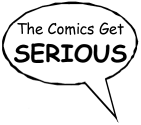

| Marilyn: The Story of a Woman. By Kathryn Hyatt. New York: Seven Stories Press, 1996. 1v. (unpaged). $14.95. ISBN 1-888363-06-1. |

|
GENRES: AUDIENCE: SYNOPSIS: EVALUATION: And then I read the thing. "Disappointing" is not too strong a word for this book. While biography/autobiography is a celebrated subgenre of comics, the best such books focus on short periods in the lives of their subjects. Tackling an entire life and career in a fairly short graphic novel would be a daunting task for the longtime pros in the industry, let alone a relatively inexperienced artist like Hyatt. And, unfortunately, her inexperience shows. The problem is that whereas a story from Marilyn's POV is an interesting take on her biography, such a take requires that Marilyn display a great deal of psychological understanding of herself and how she reacts to things. Or, perhaps, the therapist could have asked her probing questions about these things. But this book does not display such an understanding. Marilyn comes off as shallow and bewildered, crying about how she wants to be loved and looked at, but never even trying to explore WHY she feels this way. The potentially useful device of the therapist is never fully realized; indeed, the character is abandoned halfway through the book. Incidentally, the first-person narration is also abandoned. Jarring references to "Marilyn" instead of "I" caught me completely by surprise. This change is paralleled in the narration at times, when Marilyn shifts from third to first person unexpectedly and for no good reason. Another problem is the large number of questions brought up by the story. I suspect Hyatt felt that because Marilyn's story was so well known, the reader was likely to bring enough knowledge about her to the book to release Hyatt from having to explain everything. But as someone with only the most cursory knowledge of the actress, I found myself confused quite often over such issues as:
Fictionalized or not, a biography has certain obligations to its audience that this one doesn't fulfill. The art might be appropriate for strip comics and the like, but it's not the right sort of art for a full-length biography. Marilyn isn't even recognizable as Marilyn. There are a number of jarring transitions between scenes where a little narration, or even a mild visual cue like dark lines around panels, would have helped smooth the passage from one frame to another (e.g., the abovementioned final page where the speaker apparently shifts from the reporter to Hyatt without warning). I've seen reviews with phrases like "incredibly compelling" and "remarkable" describing this book. It was nominated for an Eisner award, among other things. I guess this is one of those cases where I'm thoroughly at odds with critical opinion. (Maybe not with popular opinion, though, since I found the book in a remainder store and there are no reader reviews on the Amazon site.) I found Marilyn repetitive, incomplete, and inadequately thought out. It will be of interest mainly to Marilyn Monroe fans. |
Return to Rational Magic Home
